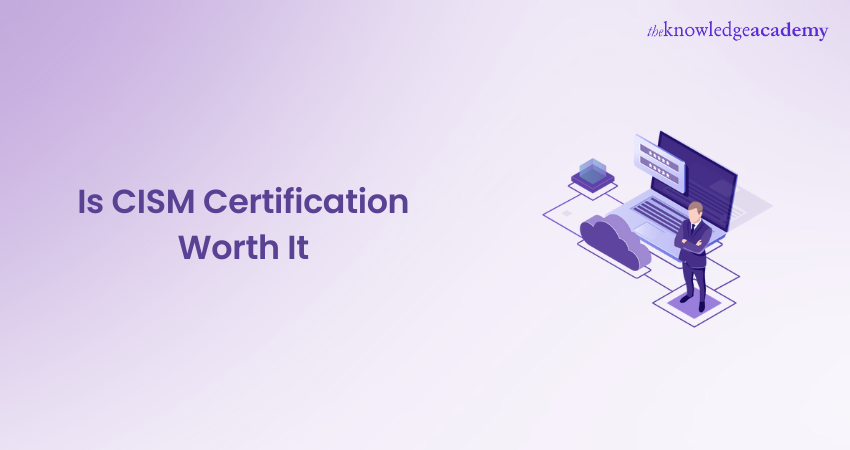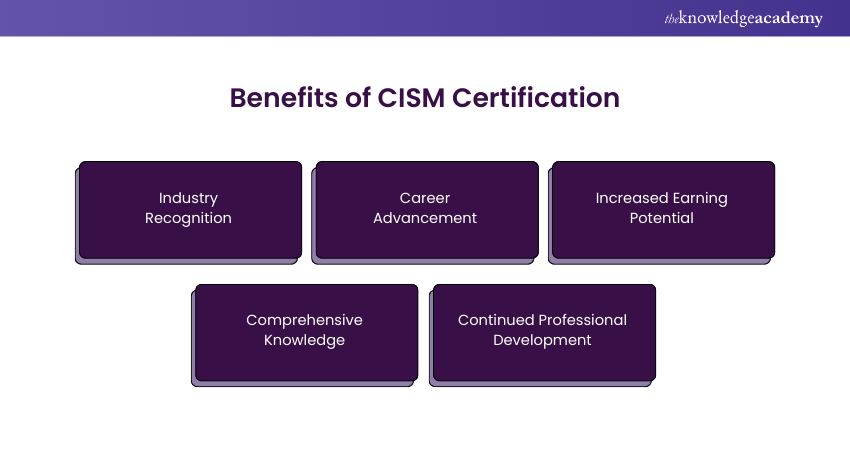We may not have the course you’re looking for. If you enquire or give us a call on +44 1344 203 999 and speak to our training experts, we may still be able to help with your training requirements.
Training Outcomes Within Your Budget!
We ensure quality, budget-alignment, and timely delivery by our expert instructors.

The future of the Certified Information Security Manager (CISM) Certification appears promising. Security professionals must stay updated on emerging trends, technologies, and certifications to ensure their skills remain relevant and in demand. Understanding "Is CISM Certification Worth It?" is essential before deciding to pursue and study for the certificate.
As a number of organisations realise the necessity of robust security practices, the demand for skilled Information Security Managers is increasing. According to the PayScale salary analysis, the average annual salary of a Certified Information Security Manager (CISM) professional is £63,000. In this blog, you will learn if CISM Certification is Worth It and get a better perspective for beginner & expert Information Security professionals to secure their careers.
Table of Contents
1) Benefits of CISM Certification
2) Is CISM Certification Worth It?
3) Job opportunities related to CISM Certification
4) Future of CISM Certification Holders
5) CISM Certification: Things to Remember
6) Conclusion
Benefits of CISM Certification
The Certified Information Security Manager (CISM) certification is highly valued in the Information Security domain and is recognised globally as a standard for Information Security Management. Obtaining the CISM Certification can be worth it for several reasons:

a) Industry Recognition: CISM is widely recognised and respected by employers, clients, and peers in the Information Security industry. It demonstrates that you have a solid understanding of Information Security Management principles and best practices.
b) Career Advancement: CISM Certification can pave the way to new career opportunities that enhance professional credibility. Employers often seek it when hiring for senior-level Information Security positions, such as IT (Information Technology) Security Manager, Information Security Officer, Security Consultant and more.
c) Increased Earning Potential: CISM Certification is associated with higher earning potential. According to industry surveys, professionals holding the CISM Certification tend to earn higher salaries than those without it. The certification signifies expertise and proficiency in Information Security Management, which can lead to better job prospects and higher-paying positions.
d) Comprehensive Knowledge: The CISM Certification covers a broad range of topics related to Information Security Management, including Information Risk Management, Governance, Incident Management, and Program Development. It provides a comprehensive understanding of the core principles and practices required to manage and protect an organisation's information assets.
e) Continued Professional Development: Maintaining the CISM Certification requires ongoing professional development and continuing education. This ensures that CISM-certified professionals stay up to date with the latest trends and developments in Information Security Management, further enhancing their knowledge and skills.
Other factors, such as experience, education, and additional certifications obtained, also play a significant role in building a successful career in Information Security.
Is CISM Certification Worth It?
Yes, the CISM or CRISC Certification is considered worth it for professionals seeking to advance their careers in the Information Security Management field. Following are some reasons why it is worth pursuing:
a) Industry recognition: The CISM Certification is widely recognised and respected in the industry. Holding the CISM Certification demonstrates your expertise and commitment to Information Security Management.
b) Career Opportunities: The CISM Certification can open doors to various job roles, including IT Security Manager, Information Security Officer, Risk Manager, and Security Consultant. It enhances your credibility and increases your chances of career advancement.
c) Comprehensive Knowledge: The CISM Certification covers essential areas of Information Security Management, including governance, risk management, incident management, program development, and more. It provides a solid foundation and practical insights into developing and managing an effective Information Security program within an organisation.
d) Enhanced Skills and Competencies: The CISM Certification helps you understand the strategic alignment between Information Security and business objectives, identify and manage risks, establish governance frameworks, and develop incident response plans.
e) Industry Networking and Professional Development: The Information Systems Audit and Control Association (ISACA), the organisation behind the CISM Certification, offers a robust network of professionals in the Information Security field. Learning How to Become CISM Certified allows you to connect with a community of like-minded professionals, share knowledge, and stay updated with the latest industry trends through events, conferences, and online forums.
While the CISM Certification offers numerous benefits, evaluating your career goals, experience, and aspirations before pursuing any certification is important.
Upgrade your Information Security Management skills with our CISM Certified Information Security Manager Course.
Job opportunities related to CISM Certification
Here are some job roles and industries where CISM-certified professionals can find employment:
a) Information Security Manager: In this profile, you would be responsible for overseeing and implementing an organisation's Information Security program, managing risks, ensuring compliance with regulations, and leading a team of security professionals.
b) IT Risk Manager: This role involves identifying and assessing risks to an organisation's information assets, developing risk mitigation strategies, and ensuring that appropriate controls and safeguards are in place.
c) Security Consultant: As a Security Consultant, you would provide expert advice and guide the organisation on developing and implementing effective Information Security strategies, conducting risk assessments, and improving security posture.
d) Compliance Officer: As a Compliance Officer or Compliance Manager, you would ensure an organisation meets regulatory and industry standards for Information Security.
e) Governance, Risk, and Compliance (GRC) Manager: GRC Managers are responsible for establishing and maintaining governance frameworks, managing risks, and ensuring compliance with relevant laws, regulations, and policies.
f) Chief Information Security Officer (CISO): The CISOs are responsible for an organisation's overall Information Security strategy and management. They ensure that information assets are protected and security initiatives align with business goals.
Industries commonly hiring CISM-certified professionals include banking and financial services, healthcare, technology, government, consulting firms, and any organisation that values Information Security and privacy.
Future of CISM Certification Holders
The future of the CISM Certification looks promising as the field of Information Security continues to evolve and grow in importance. Here are some factors that indicate a positive outlook for the future of CISM:
Increasing demand for skilled Information Security Managers: With the rise of cyber threats, data breaches, and regulatory requirements, organisations are placing greater emphasis on Information Security Management. Skilled professionals who can effectively manage and mitigate risks are in high demand. The CISM Certification equips individuals with the necessary knowledge and skills to outperform their counterparts in these roles, making it a valuable credential.
The CISM Certification adapts to these changes by regularly updating its content to ensure that certified professionals stay updated with the latest industry trends and best practices. This helps maintain the relevance and value of the certification over time.
The CISM Certification is globally recognised and respected. It provides a standard framework that transcends geographical boundaries. This global recognition ensures that the certification remains relevant and sought after by employers worldwide.
The CISM Certification is designed to complement and integrate with other frameworks and certifications in the field of Information Security. For example, it aligns with ISO/IEC 27001, a widely recognised international standard for Information Security Management Systems. This integration enhances the value of the CISM Certification by demonstrating its compatibility and applicability within existing frameworks and practices.
Elevate your career with our Chief Information Security Officer Training. Sign up now!
CISM Certification: Things to Remember
Before registering for the CISM exam, ensure you meet the prerequisites and have the necessary work experience. Reviewing the specific CISM Requirements and consulting the official resources for the most accurate and up-to-date information is recommended.
The CISM exam covers various topics, including Information Security Governance, Risk Management, Program Development and Management, and Incident Management. It requires a deep understanding of these areas and the ability to apply concepts in real-world scenarios.
a) The CISM exam has 150 multiple-choice questions that must be completed within four hours. The exam assesses your knowledge, comprehension, application, and analysis of Information Security Management concepts. The time constraint and the number of questions can make managing your time effectively and thoroughly reviewing each question challenging.
b) Also, the difficulty of the CISM (Certified Information Security Manager) exam can vary depending on your level of knowledge, experience, and preparation. However, CISM is a challenging exam requiring a solid understanding of Information Security Management concepts and practices. Here are some factors to consider:
c) The CISM exam often includes questions that require you to apply your knowledge and experience to solve complex scenarios or make decisions related to Information Security Management. These questions may challenge your ability to analyse and assess situations based on best practices and industry standards.
d) Adequate preparation is crucial for success in the CISM exam. It is recommended that students thoroughly study the official CISM Review Manual, practice with sample questions and mock exams, and consider additional study materials or training courses.
e) Understanding the exam domains, practising time management, and familiarising yourself with the question format can help you build confidence and perform better on the exam.
We hope reading this blog helped you gain a better perspective to understand Is CISM Certification Worth It for you. While the CISM exam can be challenging, it is essential to approach it with a disciplined study plan and sufficient preparation. Many candidates find the CISM exam a rewarding experience that validates their knowledge and skills in Information Security management.
Commit to achieving professional development in Information Security with the CISM Training course. Sign up today!
Frequently Asked Questions

Preparing for the CISM exam typically takes about 3 to 6 months, depending on your prior knowledge, study schedule, and commitment to understanding the material thoroughly.

Yes, the CISM Certification can significantly aid career transitions by validating expertise in Information Security Management. It enhances job prospects and opens opportunities in diverse sectors requiring strong security leadership skills.

The Knowledge Academy takes global learning to new heights, offering over 30,000 online courses across 490+ locations in 220 countries. This expansive reach ensures accessibility and convenience for learners worldwide.
Alongside our diverse Online Course Catalogue, encompassing 17 major categories, we go the extra mile by providing a plethora of free educational Online Resources like News updates, Blogs, videos, webinars, and interview questions. Tailoring learning experiences further, professionals can maximise value with customisable Course Bundles of TKA.

The Knowledge Academy’s Knowledge Pass, a prepaid voucher, adds another layer of flexibility, allowing course bookings over a 12-month period. Join us on a journey where education knows no bounds.

The Knowledge Academy offers various CISM Training, including CISM Certified Information Security Manager. This course caters to different skill levels, providing comprehensive insights into CISA Job Roles and Responsibilities.
Our IT Security & Data Protection Blogs cover a range of topics related to CISM, offering valuable resources, best practices, and industry insights. Whether you are a beginner or looking to advance your IT Security skills, The Knowledge Academy's diverse courses and informative blogs have got you covered.
Upcoming IT Security & Data Protection Resources Batches & Dates
Date
 CISM Certified Information Security Manager
CISM Certified Information Security Manager
Mon 9th Dec 2024
Mon 6th Jan 2025
Mon 3rd Feb 2025
Mon 3rd Mar 2025
Mon 14th Apr 2025
Tue 6th May 2025
Mon 2nd Jun 2025
Mon 7th Jul 2025
Mon 4th Aug 2025
Mon 1st Sep 2025
Mon 6th Oct 2025
Mon 3rd Nov 2025
Mon 1st Dec 2025







 Top Rated Course
Top Rated Course



 If you wish to make any changes to your course, please
If you wish to make any changes to your course, please


